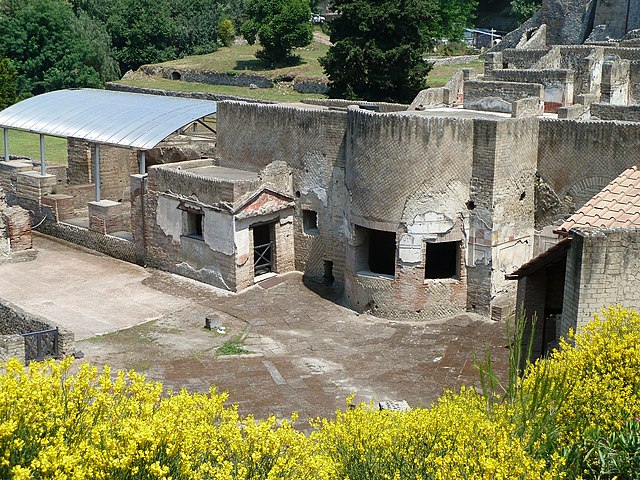The Suburban Baths are a building in Pompeii, Italy, a town in the Italian region of Campania that was buried by the eruption of Mount Vesuvius in 79 AD, which consequently preserved it.
Suburban baths near the Porta Marina
Heated pool next to caldarium
Nymphaeum with waterfall cascades in frigidarium
The dressing room in the suburban baths. It is thought that a wooden shelf may have extended along two of these walls and that on this shelf were placed boxes were bathers could place their clothes.
Homosexuality in ancient Rome
Homosexuality in ancient Rome often differs markedly from the contemporary West. Latin lacks words that would precisely translate "homosexual" and "heterosexual". The primary dichotomy of ancient Roman sexuality was active / dominant / masculine and passive / submissive / feminine. Roman society was patriarchal, and the freeborn male citizen possessed political liberty (libertas) and the right to rule both himself and his household (familia). "Virtue" (virtus) was seen as an active quality through which a man (vir) defined himself. The conquest mentality and "cult of virility" shaped same-sex relations. Roman men were free to enjoy sex with other males without a perceived loss of masculinity or social status as long as they took the dominant or penetrative role. Acceptable male partners were slaves and former slaves, prostitutes, and entertainers, whose lifestyle placed them in the nebulous social realm of infamia, so they were excluded from the normal protections accorded to a citizen even if they were technically free. Freeborn male minors were off limits at certain periods in Rome.

Statue of Antinous (Delphi), polychrome Parian marble depicting Antinous, made during the reign of Hadrian (r. 117–138 AD), his lover
A drawing based on a fragment of an ancient Roman glass vessel. 1826 - 1827 British Museum, London
A fragment of a glass vessel showing a homosexual scene. Cameo. Around 15 BCE - 1st Century CE British Museum, London
Heroic portrayal of Nisus and Euryalus (1827) by Jean-Baptiste Roman: Vergil described their love as pius in keeping with Roman morality








